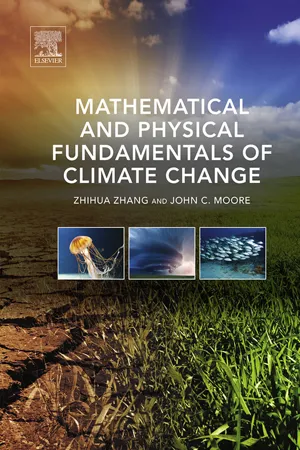
- 494 pages
- English
- ePUB (mobile friendly)
- Available on iOS & Android
Mathematical and Physical Fundamentals of Climate Change
About this book
Mathematical and Physical Fundamentals of Climate Change is the first book to provide an overview of the math and physics necessary for scientists to understand and apply atmospheric and oceanic models to climate research. The book begins with basic mathematics then leads on to specific applications in atmospheric and ocean dynamics, such as fluid dynamics, atmospheric dynamics, oceanic dynamics, and glaciers and sea level rise. Mathematical and Physical Fundamentals of Climate Change provides a solid foundation in math and physics with which to understand global warming, natural climate variations, and climate models. This book informs the future users of climate models and the decision-makers of tomorrow by providing the depth they need. Developed from a course that the authors teach at Beijing Normal University, the material has been extensively class-tested and contains online resources, such as presentation files, lecture notes, solutions to problems and MATLab codes.- Includes MatLab and Fortran programs that allow readers to create their own models- Provides case studies to show how the math is applied to climate research- Online resources include presentation files, lecture notes, and solutions to problems in book for use in classroom or self-study
Frequently asked questions
- Essential is ideal for learners and professionals who enjoy exploring a wide range of subjects. Access the Essential Library with 800,000+ trusted titles and best-sellers across business, personal growth, and the humanities. Includes unlimited reading time and Standard Read Aloud voice.
- Complete: Perfect for advanced learners and researchers needing full, unrestricted access. Unlock 1.4M+ books across hundreds of subjects, including academic and specialized titles. The Complete Plan also includes advanced features like Premium Read Aloud and Research Assistant.
Please note we cannot support devices running on iOS 13 and Android 7 or earlier. Learn more about using the app.
Information
Table of contents
- Cover image
- Title page
- Table of Contents
- Copyright
- Preface: Interdisciplinary Approaches to Climate Change Research
- Chapter 1: Fourier Analysis
- Chapter 2: Time-Frequency Analysis
- Chapter 3: Filter Design
- Chapter 4: Remote Sensing
- Chapter 5: Basic Probability and Statistics
- Chapter 6: Empirical Orthogonal Functions
- Chapter 7: Random Processes and Power Spectra
- Chapter 8: Autoregressive Moving Average Models
- Chapter 9: Data Assimilation
- Chapter 10: Fluid Dynamics
- Chapter 11: Atmospheric Dynamics
- Chapter 12: Oceanic Dynamics
- Chapter 13: Glaciers and Sea Level Rise
- Chapter 14: Climate and Earth System Models
- Index